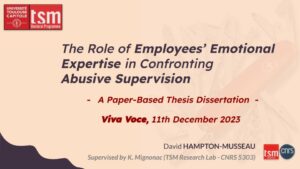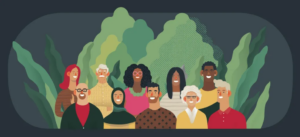🎓 Big News! 🎉🥳 —– > 11th of December 2023
Thrilled to announce that I’ve officially earned my Ph.D. in Organizational Behavior! 🎉
After a journey filled with research, meetings, and many incredible people, I’m excited to share this achievement.
🌟 My thesis, “The Role of Employees’ Emotional Expertise in Confronting Abusive Supervision,” takes a thorough analysis of the intricate world of workplace emotions.
🔸 From Spinoza to sociopsychology, it’s been a ride of discoveries and unexpected insights!
🔍 Unraveling the historical evolution of emotional intelligence, the first co-authored article crafted a narrative that bridges the past with our modern understanding. Three empirical studies uncovered the relevance of emotional expertise in navigating the affective waves with abusive supervision and employee prosocial outcomes.
🤯 Who would’ve thought higher emotional intelligence might sometimes throw a curveball by reducing forgiveness? It’s all in there, challenging assumptions and paving the way for fresh perspectives in organizational behavior.
🌐 Beyond the academic excitement, my thesis isn’t just a document; it’s an invitation for future explorations in the delicate interplay between inherent abilities and acquired responses in the workplace. Emphasizing the importance of emotional abilities is not enough… what are the motives to regulate emotions at work? Fostering ethical policies in a trustworthy and caring environment is crucial! 🔆
🥂 Cheers to the countless hours of dedication, the support of mentors and colleagues, and the uncharted territories of knowledge explored! A massive thank you to everyone who’s been part of this journey. 🙏
Excited about what lies ahead in leveraging emotional expertise to create more sustainable workplace transformations!
⭐️ PhDGraduate OrganizationalBehavior EmotionalExpertise NewBeginnings
Je suis ravi d’annoncer que j’ai officiellement obtenu mon doctorat en comportement organisationnel ! 🎉
Après un parcours rempli de recherches, de rencontres, et de plein de personnes incroyables, j’ai hâte de partager cette réalisation.
🌟 Ma thèse, « Le rôle de l’expertise émotionnelle des employés face à la supervision abusive », plonge en profondeur dans le monde complexe des émotions au travail.
🔸 De Spinoza à la sociopsychologie, ce fut une aventure de découvertes et d’éclairages inattendus !
🤯 Qui aurait pensé qu’une intelligence émotionnelle plus élevée pourrait parfois réduire le pardon ? Tout ceci ouvre la voie à de nouvelles perspectives en matière de comportement organisationnel.
🌐 Et n’oublions pas l’aspect pratique : souligner l’importance de l’expertise émotionnelle et favoriser les politiques éthiques, la confiance et l’équilibre travail-vie personnelle dans un paysage professionnel controversé actuel.
🥂 Un immense merci à tous ceux qui ont fait partie de ce voyage.
🙏 Enthousiasmé de tirer parti de l’expertise émotionnelle pour créer des lieux de travail plus durables !




